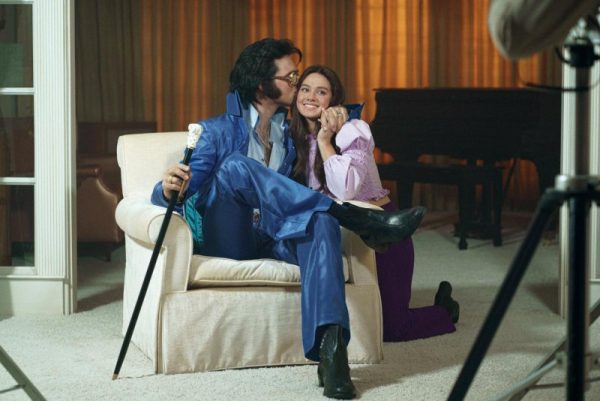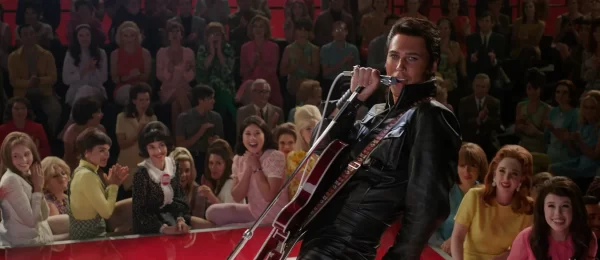Elvis and Priscilla are opposing films, offering two different perspectives on the same relationship: that of Elvis and Priscilla Presley. Despite this opposition, these movies both open with their titular characters preparing for a performance. Elvis director Baz Luhrmann sets Presley’s adrenaline-filled preparations to the loud horns and boisterous timpani of Richard Strauss’ “Also Sprach Zarathustra.” BUM…BUM…BUM… Bum Bum!
This piece, which Elvis Presley used at the beginning of many of his performances, was famously used in 2001: A Space Odyssey to convey the glory of the cosmos. The energy it has and the message it sends are immediately clear: Elvis was a bright, majestic star.
The opening scene of Priscilla, however, is a different kind of performance. As Priscilla applies her makeup and fake eyelashes, it is not accompanied by any sense of energy or freneticism, but rather, the feeling that she’s done this a thousand times and at some point, it stopped meaning anything. Priscilla’s performance wasn’t a musical one, but one of happiness in marriage, in fame, and iconography. Priscilla Presley, as we come to learn in the following hour and 40 minutes, was far from content with any aspects of her stardom. In short, Priscilla takes something that Elvis, and many previous music biopics, did, and adds nuance to improve upon it.
Priscilla was announced as Academy Award-winning writer and director Sofia Coppola’s next project on September 12, 2022, roughly two and a half months after the release and box office domination of Elvis. Because it was such a hit, and Austin Butler’s performance as Elvis became instantly iconic, it was surprising that Coppola chose to offer her own take on the celebrity so soon after that film’s release, even if the movie would focus on Elvis Presley’s wife, Priscilla. It was also announced shortly after that it wouldn’t feature any of Presley’s songs due to Elvis Presley Enterprises denying her the rights to use them. These factors made it clear that Priscilla could not be a conventional biopic, and Coppola would have to make some unconventional choices for it to stand out from the pack. Thankfully, Sofia Coppola has never been a traditional filmmaker. Even her most commercially successful projects, such as Lost in Translation, for which she won a Best Original Screenplay Oscar, are in line with Coppola’s usual patient and lonely style. Thus, Priscilla has ended up as one of the best movies of 2023 and a vast improvement on Elvis and the other films in the slate of recent biopics.

Priscilla’s rebuttal of Elvis doesn’t end with the opening scene. The visual style of the film is the direct opposite of Baz Luhrmann’s frenetic camera movement and extravagant color palette. Elvis never stops moving, reflecting his wild personal life and the rollercoaster arc of his career. There’s never a moment to breathe, with even the most internal and dramatic moments being swallowed up by quick edits and flashy cinematography. This style got Elvis nominations for Best Cinematography and Best Editing, but it also doesn’t allow for any type of contemplation.
Priscilla, meanwhile, lives in loneliness. Graceland is not a fun playground for Elvis’ family and friends, it’s a larger, oppressive, labyrinthine manor not unlike Manderley from Alfred Hitchcock’s Rebecca (which Sofia Coppola’s 2017 film, The Beguiled, also draws from). Anytime something does happen it’s when Elvis is roping Priscilla into his latest phase, whether it be gifting her a gun for her high school graduation and taking her to a shooting range, or a quick jaunt into spirituality that is only stopped when Elvis’ manager, Colonel Tom Parker, tells him it’s impacting record sales. Parker’s character is another sign of how Coppola takes the Presley story and subverts it to a positive effect. Tom Hanks’ portrayal of the Colonel in Elvis was arguably the worst major performance of 2022: Hanks plays him as a cartoon villain, more like the Riddler than any real person who ever lived. The Colonel in Priscilla isn’t ever on screen, only exerting his influence over Elvis from over the phone. In contrast with Priscilla’s attempts to connect to Elvis and guide his life and career that come from a place of love, the Colonel (even though he is more successful than Priscilla in influencing Elvis) is an outsider, both physically and emotionally.
The thing that Priscilla gets the most right about Elvis, however, is the king himself. Elvis, strangely enough, doesn’t really care about Elvis as a person as much as the idea of him. The movie centers more around Parker’s relationship with Elvis and puts most of the blame for Elvis’ career dips on his shoulders. Even beyond that, Elvis never really acknowledges the problematic nature of its main character: there are a few scenes where he takes drugs, but that’s basically it. Elvis certainly does not mention Presley’s alleged grooming of Priscilla, or the various affairs that he had during their marriage, a constant thread through Priscilla that causes the titular character plenty of distress. Elvis does a good job, admittedly, of creating a character that the audience can root for: Presley is socially conscious, he’s a musical prodigy, he cares about his family. Beyond that, the film is too busy zooming around Graceland and Las Vegas to acknowledge Elvis’ less flattering qualities.

Priscilla certainly pays attention to the negative aspects of Elvis’ life and his and Priscilla’s marriage. But it also does a good job of creating sympathy for Elvis’ situation. In the third act, there’s a quick interlude where we see Elvis performing, cloaked in shadow, fans roaring from a distance, the only sound being the horns of Richard Strauss’ “Also Sprach Zarathustra.” It’s a painful portrayal of the malaise of fame that Elvis found himself in going into the 1970s. In the singer’s words, he’s caught in a trap, he can’t get out.
Elvis isn’t a bad movie, and it certainly succeeds at what it’s trying to do and say. However, that success is limited by a fear of the rough edges of its subject’s life. Priscilla works precisely because it doesn’t have those apprehensions and dives into the complexities of Priscilla, Elvis, and the culture that they shaped and shaped them. It’s a bigger risk, further proven by their varied box office success (Priscilla has made just over 15 million dollars at the domestic box office through 3 weeks, Elvis doubled that in its first weekend), but the creative success is greater, and at the end of the day, it paints a more complete and competent picture of its subjects.
Priscilla is currently still in theaters.




